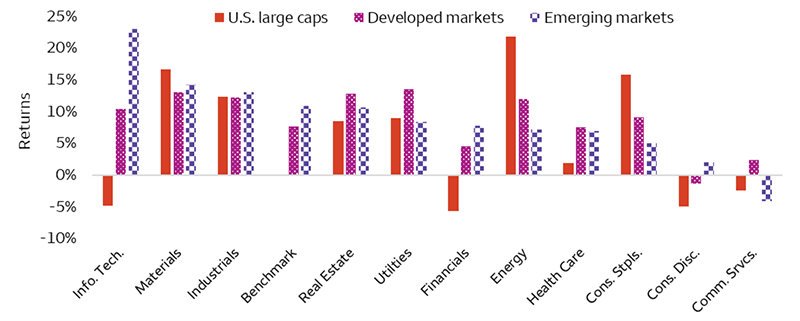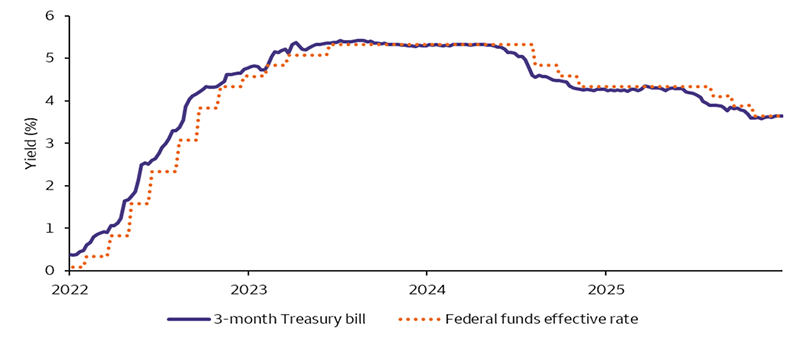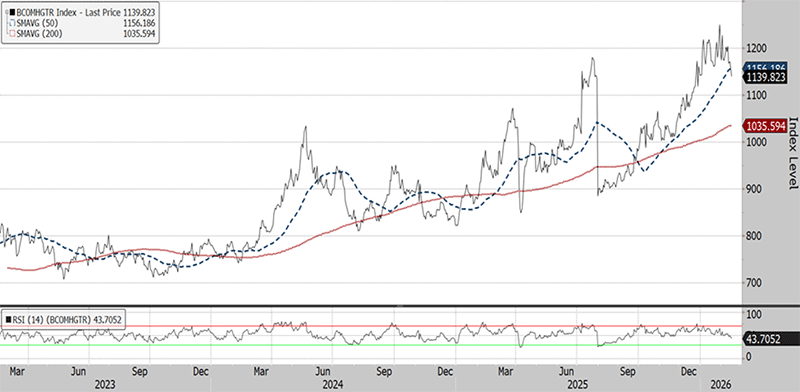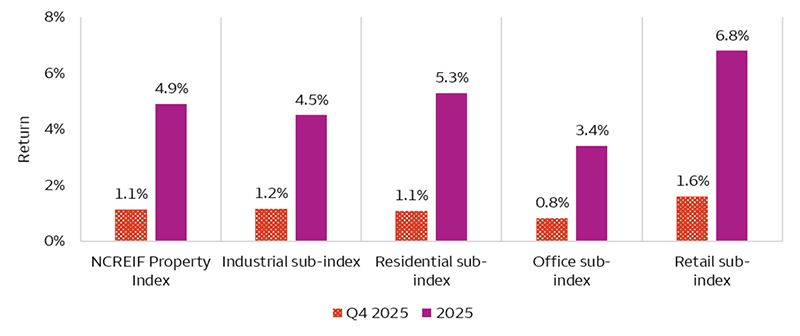Forecasts and targets are based on certain assumptions and on views of market and economic conditions which are subject to change.
Each asset class has its own risk and return characteristics. The level of risk associated with a particular investment or asset class generally correlates with the level of return the investment or asset class might achieve. Stock markets, especially foreign markets, are volatile. Stock values may fluctuate in response to general economic and market conditions, the prospects of individual companies, and industry sectors. Foreign investing has additional risks including those associated with currency fluctuation, political and economic instability, and different accounting standards. These risks are heightened in emerging markets. Small- and mid-cap stocks are generally more volatile, subject to greater risks and are less liquid than large company stocks. Bonds are subject to market, interest rate, price, credit/default, liquidity, inflation and other risks. Prices tend to be inversely affected by changes in interest rates. High yield (junk) bonds have lower credit ratings and are subject to greater risk of default and greater principal risk. The commodities markets are considered speculative, carry substantial risks, and have experienced periods of extreme volatility. Investing in a volatile and uncertain commodities market may cause a portfolio to rapidly increase or decrease in value which may result in greater share price volatility. Investing in copper or other precious metals involves special risk considerations such as severe price fluctuations and adverse economic and regulatory developments affecting the sector or industry. Real estate has special risks including the possible illiquidity of underlying properties, credit risk, interest rate fluctuations and the impact of varied economic conditions. Cash alternatives typically offer lower rates of return than longer-term equity or fixed-income securities and provide a level of liquidity and price stability generally not available to these investments. Some examples of cash alternatives include: bank certificates of deposit; bank money market accounts; bankers’ acceptances, federal agency short-term securities, money market mutual funds, Treasury bills, ultra-short bond mutual funds or exchange-traded funds, and variable rate demand notes. Each type of cash alternative has advantages and disadvantages which should be discussed with your financial advisor before investing. Sector investing can be more volatile than investments that are broadly diversified over numerous sectors of the economy and will increase a portfolio’s vulnerability to any single economic, political, or regulatory development affecting the sector. This can result in greater price volatility.
Alternative investments, such as hedge funds, private equity/private debt and private real estate funds, are speculative and involve a high degree of risk that is appropriate only for those investors who have the financial sophistication and expertise to evaluate the merits and risks of an investment in a fund and for which the fund does not represent a complete investment program. They entail significant risks that can include losses due to leveraging or other speculative investment practices, lack of liquidity, volatility of returns, restrictions on transferring interests in a fund, potential lack of diversification, absence and/or delay of information regarding valuations and pricing, complex tax structures and delays in tax reporting, less regulation and higher fees than mutual funds. Hedge fund, private equity, private debt and private real estate fund investing involves other material risks including capital loss and the loss of the entire amount invested. A fund's offering documents should be carefully reviewed prior to investing.
Hedge fund strategies, such as Equity Hedge, Event Driven, Macro and Relative Value, may expose investors to the risks associated with the use of short selling, leverage, derivatives and arbitrage methodologies. Short sales involve leverage and theoretically unlimited loss potential since the market price of securities sold short may continuously increase. The use of leverage in a portfolio varies by strategy. Leverage can significantly increase return potential but create greater risk of loss. Derivatives generally have implied leverage which can magnify volatility and may entail other risks such as market, interest rate, credit, counterparty and management risks. Arbitrage strategies expose a fund to the risk that the anticipated arbitrage opportunities will not develop as anticipated, resulting in potentially reduced returns or losses to the fund.
Bloomberg Copper Subindex Total Return Index is a single commodity subindex of the Bloomberg Commodity Index composed of futures contracts on Copper.
MSCI EAFE Index is designed to represent the performance of large and mid-cap securities across 21 developed markets, including countries in Europe, Australasia, and the Far East, excluding the U.S. and Canada.
MSCI Emerging Markets Index is a free float-adjusted market capitalization index that is designed to measure equity market performance of emerging markets.
MSCI Emerging Markets Information Technology Index is designed to capture the large and mid-cap segments across Emerging Markets countries.
Russell Midcap Index measures the performance of the 800 smallest companies in the Russell 1000 Index.
Russell 1000 Index measures the performance of the 1,000 largest companies in the Russell 3000 Index, which represents approximately 90% of the total market capitalization of the Russell 3000 Index.
Russell 2000 Index measures the performance of the 2,000 smallest companies in the Russell 3000 Index, which represents approximately 8% of the total market capitalization of the Russell 3000 Index.
Russell 3000 Index measures the performance of the 3,000 largest U.S. companies based on total market capitalization, which represents approximately 98% of the investable U.S. equity market.
S&P 500 Index is a market capitalization-weighted index composed of 500 widely held common stocks that is generally considered representative of the U.S. stock market.
S&P 500 Equal Weight Index (EWI) is the equal-weight version of the widely-used S&P 500 Index. The index includes the same constituents as the capitalization weighted S&P 500 Index, but each company in the S&P 500 EWI is allocated a fixed weight - or 0.2% of the index total at each quarterly rebalance.
S&P 500 Information Technology Index comprises those companies included in the S&P 500 that are classified as members of the GICS® information technology sector.
NCREIF Property Index (NPI) measures the change in market value of U.S. based investment-grade, income producing operating private real estate properties held by institutional investors. The market value is based on appraisal and quarter returns are time-weighted returns, including both income and capital appreciation before investment management fees. The index consists of 12,914 investment-grade, income-producing properties with a market value of $906 billion. and includes property data covering over 100 markets (core-based statistical areas or CBSAs).
NPI provides industrial, residential, office and retail subindexes which represent performance for each of those sectors. For Q4 2025, the market value breakdown by property type is about 18% office, 29% residential, 13% retail, 34% industrial with the remaining 6% consisting of hotel, self-storage, and seniors housing and “other” sectors.
Green Street collects data primarily through proprietary research, verified transaction databases, and digital analytics tools to provide commercial real estate (CRE) intelligence. They gather insights on property-level fundamentals, rent comps, and sales data ($5M+).
Key data collection methods include:
- Proprietary Research & Analysis: Deep analysis of public and private market data by a team of research analysts, including forecasts for operating fundamentals.
- Verified Comps Database: Collection of verified sales and rent comparable data across the U.S., Canada, and Europe.
- Digital & Web Tracking: Green Street uses HubSpot for marketing analytics, collecting data on website visits, downloads, and user interactions.
- Retail/Specialized Data: They gather granular insights on vacancies, tenant mix, and footfall.
An index is unmanaged and not available for direct investment.
Global Investment Strategy (GIS) is a division of Wells Fargo Investment Institute, Inc. (WFII). WFII is a registered investment adviser and wholly owned subsidiary of Wells Fargo Bank, N.A., a bank affiliate of Wells Fargo & Company.
The information in this report was prepared by Global Investment Strategy. Opinions represent GIS’ opinion as of the date of this report and are for general information purposes only and are not intended to predict or guarantee the future performance of any individual security, market sector or the markets generally. GIS does not undertake to advise you of any change in its opinions or the information contained in this report. Wells Fargo & Company affiliates may issue reports or have opinions that are inconsistent with, and reach different conclusions from, this report.
The information contained herein constitutes general information and is not directed to, designed for, or individually tailored to, any particular investor or potential investor. This report is not intended to be a client-specific suitability or best interest analysis or recommendation, an offer to participate in any investment, or a recommendation to buy, hold or sell securities. Do not use this report as the sole basis for investment decisions. Do not select an asset class or investment product based on performance alone. Consider all relevant information, including your existing portfolio, investment objectives, risk tolerance, liquidity needs and investment time horizon. The material contained herein has been prepared from sources and data we believe to be reliable but we make no guarantee to its accuracy or completeness.
Wells Fargo Advisors is registered with the U.S. Securities and Exchange Commission and the Financial Industry Regulatory Authority, but is not licensed or registered with any financial services regulatory authority outside of the U.S. Non-U.S. residents who maintain U.S.-based financial services account(s) with Wells Fargo Advisors may not be afforded certain protections conferred by legislation and regulations in their country of residence in respect of any investments, investment transactions or communications made with Wells Fargo Advisors.
Wells Fargo Advisors is a trade name used by Wells Fargo Clearing Services, LLC and Wells Fargo Advisors Financial Network, LLC, Members SIPC, separate registered broker-dealers and non-bank affiliates of Wells Fargo & Company.




 Sources: Bloomberg and Wells Fargo Investment Institute. Data is as of February 17, 2026. U.S. large caps are represented by the S&P 500 Index, developed markets are represented by the MSCI EAFE Index, and emerging markets are represented by the MSCI Emerging Markets Index. Sector performance is represented by the S&P 500, MSCI EAFE, and MSCI Emerging Markets sector indices. An index is unmanaged and not available for direct investment. Past performance is no guarantee of future results.
Sources: Bloomberg and Wells Fargo Investment Institute. Data is as of February 17, 2026. U.S. large caps are represented by the S&P 500 Index, developed markets are represented by the MSCI EAFE Index, and emerging markets are represented by the MSCI Emerging Markets Index. Sector performance is represented by the S&P 500, MSCI EAFE, and MSCI Emerging Markets sector indices. An index is unmanaged and not available for direct investment. Past performance is no guarantee of future results. Sources: Bloomberg and Wells Fargo Investment Institute. Data as of February 9, 2026. Money market fund yields are represented by the yield on a three-month Treasury bill. Yields represent past performance and fluctuate with market conditions. Current yields may be higher or lower than those quoted above. Past performance is no guarantee of future results.
Sources: Bloomberg and Wells Fargo Investment Institute. Data as of February 9, 2026. Money market fund yields are represented by the yield on a three-month Treasury bill. Yields represent past performance and fluctuate with market conditions. Current yields may be higher or lower than those quoted above. Past performance is no guarantee of future results. Sources: Bloomberg and Wells Fargo Investment Institute. Daily data from February 17, 2023 through February 17, 2026. BCOMHGTR = Bloomberg Copper Subindex Total Return. SMAVG (50) = 50-day simple moving average. SMAVG (200) = 200-day simple moving average. RSI = relative strength index. An index is unmanaged and not available for direct investment. Past performance is no guarantee of future results.
Sources: Bloomberg and Wells Fargo Investment Institute. Daily data from February 17, 2023 through February 17, 2026. BCOMHGTR = Bloomberg Copper Subindex Total Return. SMAVG (50) = 50-day simple moving average. SMAVG (200) = 200-day simple moving average. RSI = relative strength index. An index is unmanaged and not available for direct investment. Past performance is no guarantee of future results. Sources: NCREIF and Wells Fargo Investment Institute. Data as of December 31, 2025. Q4 = fourth quarter. An index is unmanaged and not available for direct investment. Past performance is no guarantee of future results.
Sources: NCREIF and Wells Fargo Investment Institute. Data as of December 31, 2025. Q4 = fourth quarter. An index is unmanaged and not available for direct investment. Past performance is no guarantee of future results.